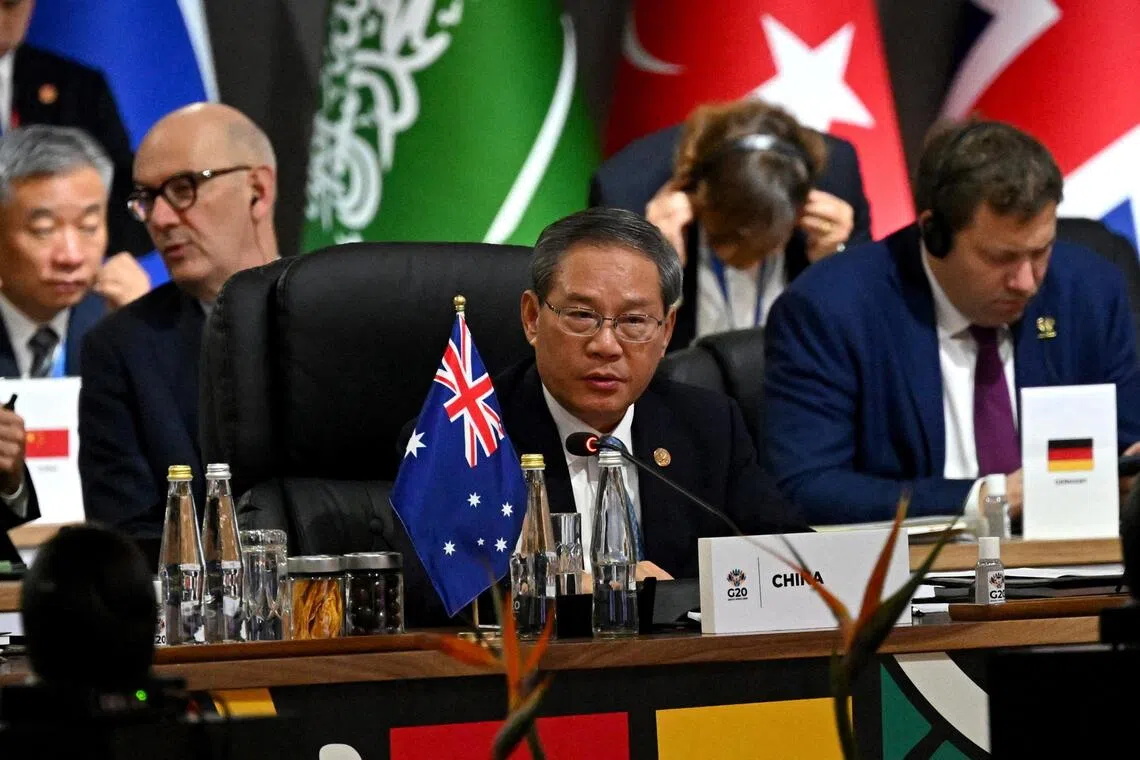China pitches closer ties to Germany in strategic industries to ease rare earth strains
Sign up now: Get ST's newsletters delivered to your inbox

China's Prime Minister Li Qiang said he hoped Germany would maintain a rational and pragmatic policy towards China.
PHOTO: REUTERS
Follow topic:
BEIJING - China pitched stronger ties in its highest-level talks with Germany’s new government as Beijing’s top European trade partner seeks to smooth tensions over rare-earth curbs that have choked German production lines and prompted calls for de-risking.
Beijing has staged an uncharacteristically swift turnaround in relations with Berlin since discord over Chinese export curbs on chips and rare earths resulted in German Foreign Minister Johann Wadephul cancelling an October trip to China
“China and Germany are important economic and trade partners,” China’s Premier Li Qiang told German Chancellor Friedrich Merz on the sidelines of the G-20 summit on Nov 23, state media reported.
“Our two governments should work together to strengthen dialogue and communication to properly address their respective concerns,” a Xinhua readout quoted China’s second-ranking official as saying, before pitching closer cooperation in a series of strategic industries.
A meeting between the two had appeared unlikely only months earlier, but with both countries embroiled in the fallout from the US-China trade war and searching for ways to diversify from the world’s top consumer market, those differences have been set aside.
Mr Merz is expected to visit China soon, where he should meet Chinese President Xi Jinping, while top diplomat Mr Wadephul agreed with his Chinese counterpart Wang Yi earlier in November to reschedule his trip to the Chinese capital.
Meanwhile, German Finance Minister Lars Klingbeil met China’s top economic official, Vice-Premier He Lifeng, last week for talks that both countries said advanced efforts to move on from the trade tensions.
Trade ties Trump tensions
For all the friction over Beijing’s support for Russia and its actions in the Indo-Pacific, and Berlin’s vocal criticism of China’s human rights record and state-subsidised industrial policy, the two countries remain bound by a vast and mutually advantageous commercial relationship.
China bought US$95 billion (S$124 billion) worth of German goods in 2024, around 12 per cent of which were cars, Chinese data shows, putting it among the US$19 trillion economy’s top 10 trading partners.
Germany purchased US$107 billion of Chinese goods, mostly chips and other electronic components.
But Berlin stands out for China as an investment partner, having injected US$6.6 billion in fresh capital in 2024, according to data from the Mercator Institute for China Studies, accounting for 45 per cent of all foreign direct investment into China from the European Union and the United Kingdom.
Mr Li said he “hoped Germany would maintain a rational and pragmatic policy towards China, (and) eliminate interference and pressure”, during their meeting in South Africa, which is hosting the first G-20 summit on the continent.
Germany is yet to publish a readout of the meeting.
For Germany, China represents a practically irreplaceable car market, and is responsible for almost a third of German carmakers’ sales.
German chemicals and pharmaceuticals firms also have a large presence in the country, although they are facing increasing pressure from domestic competitors.
“China is willing to work with Germany to seize future development opportunities... in emerging fields such as new energy, smart manufacturing, biomedicine, hydrogen energy technology, and intelligent driving,” Mr Li said. REUTERS

